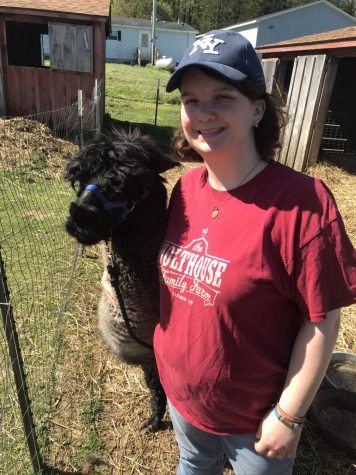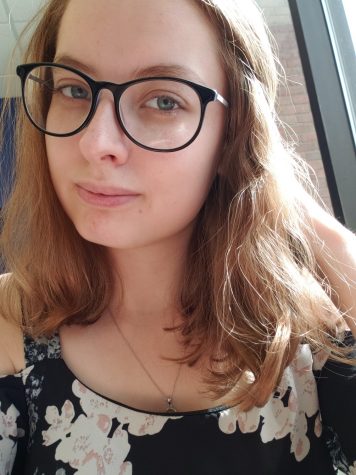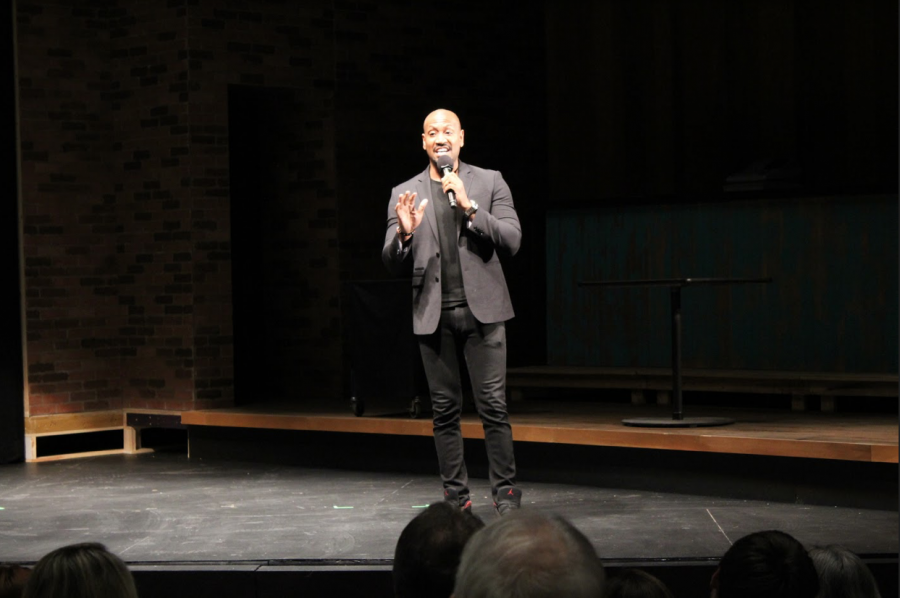History Has Its Eyes on You: Bryan Terrell Clark visits campus to talk to students about finding their purpose
Bryan Terrell Clark talks to students about finding one’s purpose at 7 p.m. on Wednesday, Feb. 26, 2020, in the Vukovich Center for the Arts.
History has its eyes on you, even if you have not played George Washington in Hamilton on Broadway.
Bryan Terrell Clark, who filled the role of George Washington in the famous Broadway musical in 2017, and then again during the holiday season 2019, visited campus and gave a lecture titled, “Finding Your Purpose: From Baltimore to Broadway’s ‘Hamilton’” at 7 p.m. Wednesday, Feb. 26, in the Gladys Mullenix Black Theatre in the Vukovich Center for Communication Arts.
Clark was introduced by Charles Allan Ross, ’20, who spoke of Clark’s numerous roles, and at one point began to say his introduction backwards. It was later revealed that this was a challenge that Clark posed to Ross before the lecture.
“Tonight, we welcome Bryan Terrell Clark, who is a singer, songwriter, philanthropist and actor, perhaps best known for his starring role as George Washington in ‘Hamilton: The American Musical,’ on Broadway,” Ross said.
Clark began his lecture by asking the audience how many people had seen the musical, and then by singing Washington’s introduction in Hamilton with the song “Right Hand Man.”
“The introduction of George Washington is so powerful in the show, because you don’t meet him as the president,” Clark said. “You meet him as the general. And so you are introduced to him in battle.”
Clark said people commonly ask him if they are going to be able to understand the show, because it is rap.
“I think to myself, ‘it’s brilliant,’” Clark said. “The show is designed in this brilliant way because it is literally the Shakespeare of our time. Oftentimes people ask what the rap and the rhyme of it all will be and I think to myself that’s interesting because, I am not a rapper. I’m a classically trained actor who sings gospel and musical theatre. … It’s something about what this show is and the timing of this show that makes it a juggernaut in my industry, and what I realized is that is all about being your authentic self.”
Clark then described the multiple characteristics of the writer and producer of Hamilton, Lin-Manuel Miranda, saying that putting all of those things together, “none of that makes sense when it comes to the landscape of musical theatre.”
“But by him being who he is, unapologetically stepping into his authenticity, he has created something deeply unique,” Clark said. “I believe at the crux of all of that, that’s about being passionate about what is authentic to yourself.”
Prior to the lecture on Wednesday, Clark held an acting workshop with students, who he described at this point in his lecture as his favorite group of students he’s worked with so far on his speaking tour.
“One of the students said, ‘Do you say that everytime you go to a university or college?” and I said, ‘no I don’t,’” Clark said.
Then Clark mentioned a question he was asked earlier that day, which tied into the real message of what he was going to talk about during his lecture, about how he started acting and when he first knew he wanted to be an actor and work in music.
“I asked my mom this not too long ago, and she said ‘before you could talk,’” Clark said.
According to Clark’s mother, Clark would walk up to the TV or radio before he was old enough to talk and “just bounce.”
This brought Clark into the story of his mother, Tanya Clark, and her love for education. Clark described her as an innovator who switched back and forth between being a teacher, principal and administrator at the school she worked with, along with also being a Sunday School teacher who became a minister. Clark’s mother also worked in a school environment where students did not come from the best home lives, and was “an angel in that space,” according to Clark.
Next, Clark talked about his father, who was the opposite of his mother when it came to education. Clark said his father was very charismatic, but never went to college even though he would have gotten a full ride on a track scholarship. What his father did do, however, was convince the managers of Westinghouse Electric Corporation to let him work there. Clark’s family would only find out after seven years that his father was the company drug dealer.
“When I really think about that time in my life, it was a pivotal turning point, but it was also a very dark time,” Clark said. “It was interesting because I sat my parents down and said, ‘Hey can we have a family meeting?’ I had to be like 12 or 13, however old you are when you first start middle school.”
According to Clark, at this family meeting Clark told his parents that he understood the situation but did not want to hear about it anymore because he saw how unhappy they both were. After that, he pledged to be and was silent for the next three years, with the exception of singing in his gospel choir.
Clark described how he would stand in the back of the choir and sing, until one day the person next to him heard him sing and called attention to it, and the choir director pulled him to the front to sing a solo.
“After that moment you could find me kind of coming alive in gospel choir,” Clark said. “I was either singing a solo, or directing.”
Clark’s theatre, and specifically musical theatre, experience began soon after that when his aunt brought him to his first acting class. Clark described how he liked acting but did not fully understand or appreciate musicals until the first time he saw “Rent.”
“When I saw ‘Rent,’ I was undone,” Clark said.
Clark began to skip school and get on a Greyhound bus and travel from his home in Baltimore, to New York City to audition for the role of Benny in “Rent”. Clark received many callbacks for Benny but never the part. He continued to skip school for auditions when he went off to college at Temple University, and became friends with the sister of Billy Porter. Porter helped him to gain a deeper understanding of musical theatre, and Clark began to love it.
That summer, Clark became a director at a theatre camp and helped to put on a production of “The Wiz.” After that, it came time for him to begin auditioning for graduate school programs, specifically NYU and Yale Universities. The head of the program that was helping students to audition for grad school told Clark that he should avoid those schools because of money and travel costs, and that they would be less likely to accept people of color. Clark went on to audition for both schools by himself, and got accepted to both, along with being on hold for a role in both “The Lion King” on Broadway, and the TV show, “All My Children.”
Clark ended up attending Yale school of Drama.
“And I just knew, in my inner being, that I was supposed to be there,” Clark said. “This is something that I’ve been telling these young folks all day, so I’m going to reiterate it. This is a time in your life that is really important. Because when you’re somewhere between the ages of 17 and I would say your early 20s — this is the time that you can take advantage of the space that’s been given for you. College and university is supposed to be a time we set aside a safe space for you to begin to think critically for yourself.”
Clark said that college is also an important time to start finding one’s own inner voice, as at first that inner voice is more likely to be reminiscent of parents for a very long time.
“But you’ve got to find out what your inner voice sounds like,” Clark said. “And this is a safe space … where you can begin to listen to that voice for yourself.”
During Clark’s time at Yale, he began to feel what he described as a cognitive dissonance. He became aware of a “secret black man code” that existed at Yale where when being pulled over by a police officer, a black man would pull out his driver’s license and also his Yale ID and be let off or at least let off easier than normal.
“And there was a cognitive dissonance because I was so angry,” Clark said. “Because what does that mean? That some other young guy who just happened to be born and grow up there and actually is a citizen of that community is unsafe because they don’t go to Yale?”
Clark decided to stay at Yale that summer, and took part in a project at the college where the students helped other people to tell their stories through art.
“We literally took their stories and helped them to write and produce plays with them, and that changed my life,” Clark said. “And it was in that moment that I realized there is a difference between passion and purpose.”
Clark added that during his current speaking tour, he has come to the realization that as human beings everyone is going to die someday, and that as human beings everyone has love and fear.
“What I find to be most consistent in that is that most adults generally aren’t happy,” Clark said. “And it’s weird because I’m generally happy all the time. Not in a weird way, like I’m pooping glitter or something, but I do have a general sense of happiness in my inner being. And I realized that it’s because I’m very clear on what I’m passionate about, and I learned something during that summer. I’m also clear in my purpose.”
Clark then returned to his story, describing how he was given the opportunity to go to London, but instead went to a different program in Minneapolis. Along the way, Clark met many well-known people that would become great mentors to him. This included a man who had a role on the TV show “Law & Order,” who, because of his role in the show, was able to turn a garage into a guest house for his sick mother who was at the time away from him in Detroit. His mother was able to come and live in the guest home until she passed away.
“And he said, ‘that’s why I love my job, and that’s my reason why,’” Clark said.
Clark then decided to move to Los Angeles in the middle of a strike and the 2008 recession. He began to host an open mic night at a bar, where one night Stevie Wonder walked in and sang. After his appearance, more stars came to his open mic night, which opened up a path into the music industry for Clark.
“I say it all the time, life is the road, but your passion is the compass,” Clark said. “You follow your compass, and it will lead you to your purpose.”
Soon after, Clark began to audition for the role of Marvin Gaye in the musical “Motown.” After a lengthy process where he was not given the role, and at first only given the role of a Temptation in the show, Clark eventually filled the role of Marvin Gaye on Broadway. During the first week of rehearsal for the show, Clark received a call from his mom telling him that his cousin had walked out to his car and been caught in the middle of a fight, where he was killed in a crossfire.
“I was devastated and broken, and then angry,” Clark said. “I didn’t understand how in the greatest country in the world, something like this could happen.”
He then described how a few days later a stage manager came up to him and asked him about his cousin’s children, telling him to “start there,” when it came to having an influence and being able to make an impact through his acting and life in general. Clark then advised his audience to start with making changes and working within their personal sphere of influence when it comes to finding passion and purpose.
“If you want to bless those around you, sometimes changing the world might seem like it’s insurmountable,” Clark said. “But what about starting with your brother or sister?”
After performing in “Motown,” Clark described his audition process for “Hamilton” and how he was called in three separate times for the show, and thought that he did not need to be in it. He was then called in one more time, and was hesitant to return.
Around this same time, Clark found out that his father had been in rehabilitation 22 times for his drug addiction. He described how his father had wanted to change, and that eventually the people who worked at the rehab center said that his father had a chemical imbalance that kept him addicted. After that the center was able to figure out how to fix his addiction, and his father got off of drugs.
“And now my dad is one of my best friends,” Clark said. “And when I think about my dad and my mom, my mom is this angel, and my dad is this weird dragon. And if I’m honest, they both taught me how to fly.”
According to Clark, he thought that if his father could go through drug rehab treatment 22 times, Clark could return for one more audition in “Hamilton.” He was given the role of George Washington, and went on to become the longest running George Washington on Broadway.
Clark ended his lecture by giving the audience three challenges for the next two weeks. The challenges were; to write down 5-10 things that they were grateful for every morning, to take back the responsibility of their own happiness, and to be their own authentic self.
Clark closed by singing a song from Hamilton, “History Has Its Eyes on You,” describing it as “a great moment” in Hamilton.
“And that’s what I would leave you all with,” Clark said. “History has its eyes on you, so what is it going to see?”

Sara Holthouse is a senior from Panama, NY. This is her third year/final semester on staff, where she has previously served as news editor for the past...

Emily Rice is a senior from Orlando, Florida. She is a Psychology major with an education studies minor. This is her third year on staff as a photographer....









